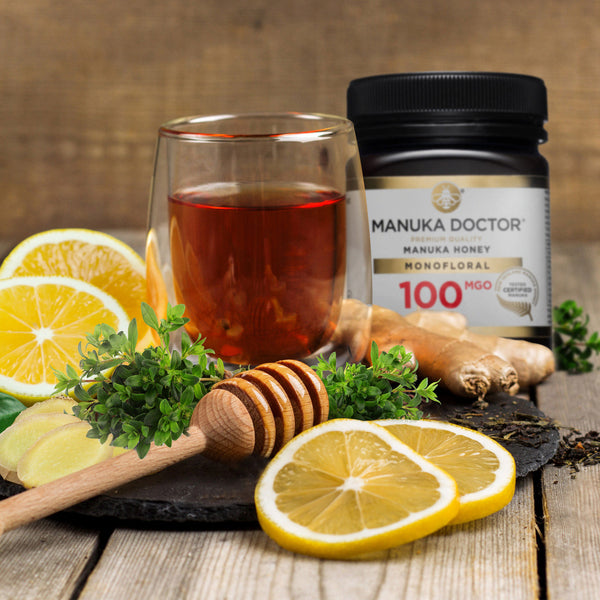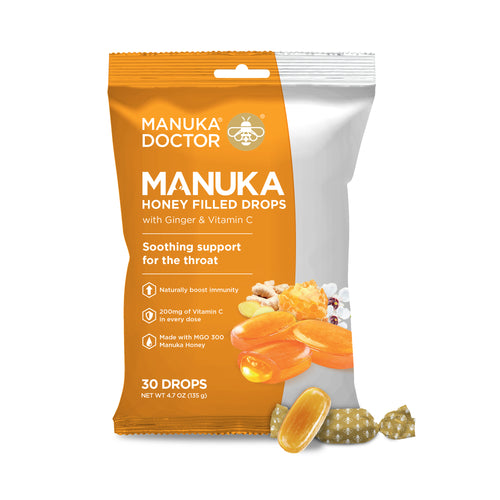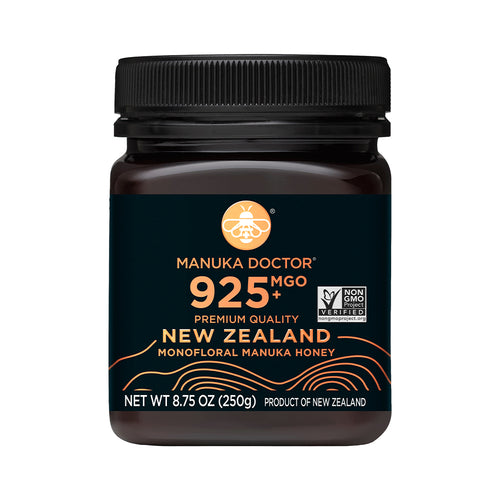Read Time: 3 minutes
Summary:
As honey’s role in wellness grows, Manuka stands out for its scientifically backed benefits. While local honey has long been linked to hay fever relief, studies suggest its effectiveness may be limited. Manuka, on the other hand, offers potent anti-inflammatory and antimicrobial properties, making it a strong contender for soothing symptoms like throat irritation and supporting gut health. With added antioxidants and a natural ability to fight bacteria, Manuka honey is a smart seasonal staple for overall wellbeing.

Manuka vs. Regular Honey: What’s the Difference?
Honey’s come a long way. Not so many years ago, you just bought a jar or squeezy bottle of whatever honey was available in the supermarket without thinking too hard about it. Now, there are so many choices. If you’re thinking about boosting your wellbeing, which do you go for? You’ve probably already heard a lot of positives about Manuka honey – but is it really superior to other types, such as local honey?
Try a new Manuka recipe today!
Healing hay fever
At this time of year, many look to honey as a potential treatment for hay fever. Traditionally, it’s often been claimed local honey may be particularly effective for easing hay fever symptoms – the theory goes that, as it contains tiny amounts of local pollen, it can desensitise your immune system to the pollens in your area. But a 2002 study from the University of Connecticut found local honey doesn’t necessarily help more than any other honey.
Scientists divided people with hay fever into three groups, including one which took raw, local honey, and found little difference between the groups.1
It’s thought this may be because the pollens in honey come from the flowers the bees feed on, and these particles are much heavier than the lighter pollens from trees and grass that usually trigger hay fever symptoms.
Of course, if you enjoy eating local honey and you feel it’s working for your hay fever symptoms, carry on – it’s certainly not going to harm you. And while the ‘local honey theory’ has been challenged, honey of all types may still have a role to play.
Some research has found honey may potentially help ease debilitating symptoms, such as sneezing and running eyes, by moderating the immune system’s overreaction to pollen.2 More studies are needed to further investigate how honey could help but it could be worth trying a daily spoonful to see if it makes a difference to your symptoms.
And as Manuka honey is known to have particularly powerful anti-inflammatory properties, it may be especially helpful. It could also help if throat irritation’s one of your hay fever symptoms – try it in a soothing hot drink.

A word of caution, though – it’s important to manage your hay fever symptoms well, particularly if you also have asthma. Hay fever symptoms can be a trigger for a potentially life-threatening asthma attack, so make sure you follow the advice from your doctor or pharmacist to stay on top of symptoms – don’t rely on alternative ways to manage hay fever if you have asthma as well.
Which honey is best for general wellness this summer?
When it comes to overall wellbeing, all types of honey are known to have some healing properties. Research has found honey contains a number of nutrients, including some minerals, and up to thirty types of polyphenols. These polyphenols are antioxidants, which means they may help to fight the oxidative damage to the body’s cells caused through factors such as stress, poor diet and pollution.3,4

Honey’s also known to have antimicrobial actions, helping to inhibit the growth of bugs.5 And NICE – the body that provides evidence-based guidance around health – recommends honey as your go-to cough soother over cough medicines from the pharmacist, making it a must-have for summer colds.6 There’s also evidence honey is anti-inflammatory, and some research has shown it may help ease disorders of the digestive tract.7
If you’re looking to honey to heal however, think about making it Manuka, which has been found to have more powerful antimicrobial actions than standard honey,8 and, according to research, may be particularly helpful for supporting gut health – early studies suggest it may help to promote the growth of good gut bacteria and potentially help inhibit food poisoning bugs.9
There are many different ways to enjoy Manuka honey in the warmer weather. Slather it on crusty bread, stir it into yoghurt or coconut yoghurt or add it to fruit smoothies. View some of our recipe suggestions here.
Read more: Is prevention better than cure: Manuka Honey, immune system and more
Sources:
1 Rajan TV et al. Effect of ingestion of honey on symptoms of rhinoconjunctivitis. Annals of Allergy, Asthma & Immunology Volume 88, Issue 2, February 2002, Pages 198-203
2 Asha’ari ZA et al. Ingestion of honey improves the symptoms of allergic rhinitis: evidence from a randomized placebo-controlled trial in the East Coast of Peninsular Malaysia. Ann Saudi Med. 2013 Sep-Oct; 33(5): 469–475
3 Samarghandian S et al. Honey and health: a review of recent clinical research. Pharmacognosy Res. 2017 Apr-Jun; 9(2): 121–127
4 National Institutes of Health: Antioxidants in depth https://nccih.nih.gov/health/antioxidants/introduction.htm
5 As source 3
6 https://www.nice.org.uk/news/article/antibiotics-should-not-be-issued-as-first-line-of-treatment-for-a-cough-says-nice-and-phe
7 As source 3
8 As source 3
9 Mohan A et al. Effect of honey in improving the gut microbial balance. Food Quality and Safety, Volume 1, Issue 2, 1 May 2017






